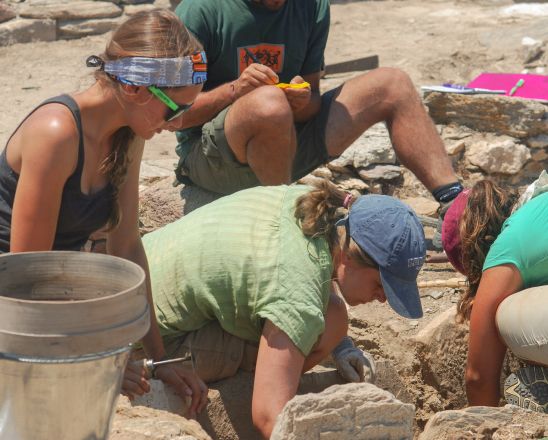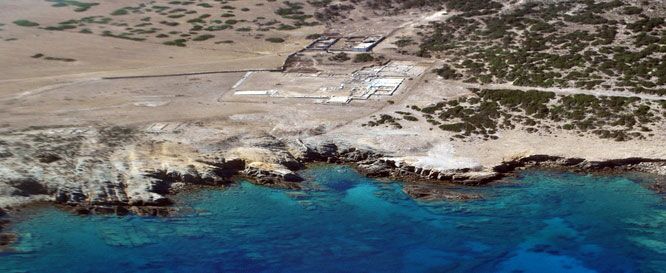
Excavating in the Aegean: The Despotiko Field School (Paros, Antiparos)
NOTE: This course starts on the island of Antiparos and ends on the island of Paros, Greece. Students should arrange to arrive in Athens the day before the start of the program, and to depart from Athens the day after the end of the program, in order to have time for their ferry connections between Athens and Antiparos/Paros.
This summer course offers students the unique opportunity to actively participate in the excavation of one of the most prominent sanctuaries of the Aegean, situated on the uninhabited islet of Despotiko, west of Antiparos, in the center of the Cyclades. Systematically excavated since 2001, this sanctuary -dedicated to Apollo-, proved to be almost as rich as the well-known sanctuary on the sacred island of Delos in its architectural development and its dedications.
While unveiling the history and the different phases of ritual activity at this important Cycladic sanctuary, the participants will be introduced to archaeological fieldwork methods and theory. In particular, the excavation will focus on the exploration of a number of edifices not only within the sacred precinct, but also outside of it. An oval or apsidal building of the 8th century B.C., which represents the earliest construction of the site up to date, presents special interest. The interpretation of its character and function is crucial for reconstructing the earliest ritual practices at the site. The sanctuary attracted numerous votive dedications of various types. This gives students the opportunity to familiarize themselves with a variety of artifacts of different materials and types covering a wide chronological range extending from the Early Iron Age (9th-8th c. BC) to the Classical period.
See Vimeo video for information on Despotiko: Despotiko Video
Go to article on the archaeological excavation on Despotiko: Dig sheds light on island sanctuary
For the latest update on Despotiko go to: Archaeologists wrap-up phase one
Course Details
Schedule
During the first three weeks of the course, students will reside in the village of Agios Georgios on the island of Antiparos, from where they will be transported daily by a boat at the excavation site on Despotiko. During these weeks, they will study and experience the entire excavation procedure. They will be taught the basic methods of stratigraphical excavation, onsite documentation, recording and processing of the finds. The work at the site will be combined with a number of afternoon lectures and activities at the village, including the detailed documentation of daily activities at the site, the preparation of architectural plans and, more importantly, keeping the excavation diary.
Afternoon lectures will cover the theoretical issues concerning archaeological theory and methods; the various types of archaeological evidence with a focus on the material from Despotiko; ancient religious practices and rituals; the birth and development of Greek sanctuaries and, in particular, those in the Cyclades. The aim of these lectures is to enable students to fully comprehend the purpose of systematic excavation and to place the sanctuary and its material culture into its theoretical context.
The last week of the course will be spent at Paroikia, the port town of Paros, where students will work in the storage rooms of the Archaeological Museum of Paros with material from the site. There, they will be trained at the detailed processing of the finds, mostly of pottery, figurines and other minor objects. They will therefore become acquainted with the process, which enables the detailed study, interpretation and publication of the excavated material. They will be taught archaeological drawing and photography, necessary tools for the study of the objects.
The work at the museum will be supplemented with afternoon classes, focusing on pottery and various clay finds. Students will be provided with necessary information on the main Greek pottery production centers, the clay, the shapes, uses and dissemination of Greek ceramics. The discussions will be adapted to the nature of the finds processed at the museum.
Enrollment
This course requires a minimum enrollment of 10, with a maximum enrollment of 22.
Currently registered undergraduates majoring in relevant subjects will receive priority, as will applicants with a B+ average or above. The nature of the course is primarily introductory, but students with a stronger background in archaeology will have the opportunity to do more advanced work.
Credit
60 contact hours
Essential Information
The course starts on the island of Antiparos and ends on the island of Paros. Participants should arrange to arrive on Paros by 12:00 noon on Monday, May 20, in order to reach Antiparos by 1:30 p.m. At the end of the course participants should allow themselves time to return from Paros to Athens and should not plan to fly out of Greece earlier than Sunday, June 16.
Enrolled students will have access to detailed information prior to departure that will include directions to the islands of Paros and Antiparos, and other practical information. For a general introduction to the island of Paros, including ferry and airline connections from Athens, CYA suggests the following websites: http://www.paros.gr/en/ and parosweb.com For panoramic views of the island you may visit http://www.greecevirtual.gr/en/cyclades/paros or see the webcams at paros-live.gr.
Housing & Meals
For the first three weeks of the program the students will be accommodated at Zombos Rooms To Let, in the village of Agios Georgios, on the island of Antiparos. For the last week they will be accommodated at the Aegean Village Studios in Paroikia, the port city of Paros.
Lunch will be offered Monday through Friday at Agios Georgios and at Paroikia. A welcome and a farewell dinner are also included in the course fee.
Daily Schedule
Please keep in mind that excavation work is physically demanding and requires a total commitment of time and energy. During the excavation period of the course students will be transferred by boat to Despotiko and will remain at the excavation site from 7:00 a.m. until 2:00 p.m. with a brief break in-between, Monday through Friday. You should be prepared to spend this time under the sun and in relatively high temperatures. Class meetings will take place in the late afternoon or early evening. A similar schedule will be followed during the last week of cataloguing activities in Paroikia.
Monday, May 20, 2024
1:30 p.m.: Meet your professor at the port of Antiparos and transfer to the village of Agios Georgios. Check in at Zombos Rooms To Let, where you will will be staying for the first three weeks of the program.
6:30 p.m.: Welcome and orientation session, offering students the opportunity to get acquainted with their instructor and fellow students followed by a welcome dinner.
Starting Tuesday, May 21:
7:00 a.m.: Daily boat transport to the excavation site on Despotiko (included in the course fee).
Students will be provided with basic excavation tools upon arrival at the excavation site; in addition they are advised to bring with them the following:
- Hat with wide brim
- Sun Block
- T-shirts covering the shoulders
- Sturdy shoes or closed shoes (NO sandals on the excavation)
- Long trousers – to avoid injuries & scratches from plants
- Garden Gloves, if you wish to bring your own (you will be given a pair at the excavation)
Each day you are at the excavation, you are advised to bring with you a bottle of water and a substantial snack.
2:30 p.m.: Return by boat to Agios Georgios. Lunch at the hotel.
7:00 p.m.: Class meetings/lectures/projects.
Sunday, June 09:
Transfer to Paroikia (included in the course fee). Check in at Aegean Village Studios in Paroikia, where you will spend the last week of the course.
8:00 a.m.: Daily walk to the nearby storage rooms of the Archaeological Museum to learn about and work on finds from Despotiko. Afternoon classes at the museum or at the hotel.
Friday, June 14:
Final Exams and Farewell Dinner.
Saturday, June 15:
Check out of the Hotel by 11:00 a.m.
Day-to-day Program & Itinerary
The day-to-day program and itinerary of the course are subject to change. Students are advised not to make plans for their free time or weekends in advance, as class schedules and site visits may be re-scheduled depending on local conditions.



